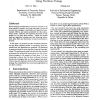Free Online Productivity Tools
i2Speak
i2Symbol
i2OCR
iTex2Img
iWeb2Print
iWeb2Shot
i2Type
iPdf2Split
iPdf2Merge
i2Bopomofo
i2Arabic
i2Style
i2Image
i2PDF
iLatex2Rtf
Sci2ools
120
click to vote
VLDB
1991
ACM
1991
ACM
Handling Data Skew in Multiprocessor Database Computers Using Partition Tuning
Shared nothing multiprocessor archit.ecture is known t.obe more scalable to support very large databases. Compared to other join strategies, a hash-ba9ed join algorithm is particularly efficient and easily parallelized for this computation model. However, this hardware structure is very sensitive to the data skew problem. Unless the parallel hash join algorithm includes some load balancing mechanism, skew effect can deteriorate t.he system performance severely. In this paper, we propose two sl;ew avoidance techniques and one skew resolution method.In particular, three new parallel hash join algorithms are presented. We developed an analytical model to study the effectiveness of these algorithms. The performance study indicates that the proposed techniques offer substant,ial improvement. over the conventional strategies in the presence of data skew. It is also interesting to observe that the skew avoidance t,echniques provide join strategies that are robust against data skew; where as ...
Related Content
| Added | 27 Aug 2010 |
| Updated | 27 Aug 2010 |
| Type | Conference |
| Year | 1991 |
| Where | VLDB |
| Authors | Kien A. Hua, Chiang Lee |
Comments (0)

